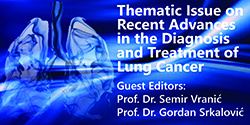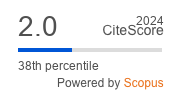Psychosocial assistance project decreases posttraumatic stress disorder and depression amongst primary and secondary schools students in post-war Bosnia-Herzegovina
Keywords:
PTSD, Depression, School Students, Psychosocial assistance, Bosnia-HerzegovinaAbstract
Objective. To assess whether psychosocial support of the School Projectof the Humanitarian Society (HS) “Prijateljice (Girlfriends)” hada positive eff ect on reducing posttraumatic consequences in Bosnia-Herzegovina primary and secondary school students, aft er the 1992-1995 war. Subjects and Methods. A stratifi ed sample of 336 students,aged 13.5±1.6 (10 to18) years, in primary and secondary schools, involvedin psychosocial support, were compared with 72 randomly selectedpeers from the same schools, not involved in this project. Datawere collected in December 2005 and in May 2006. Th e Children’sDepression Inventory and the Child Post-Traumatic Stress ReactionIndex were utilized. Statistical analysis involved McNemar’s test, Students’t-test, Chi-square test and Pearson’s correlation test. Results.According to DSM, the prevalence of PTSD and depression amongstudents involved in the School Project, signifi cantly decreased from46.1% to 13.4% and 25.6% to 1.8%, respectively (McNemar’s test,P<0.001; P<0.001, respectively). In the control group the prevalenceof PTSP and depression decreased from 30.5% to 23.6% and 22.2%to 11.1%, respectively, with no signifi cance (McNemar’s test, p=0.332;p=0.077, signifi cantly). Girls had a signifi cantly higher prevalence ofboth PTSD and depression compared to the boys. Age, the numberof traumatic episodes, and suicidal behavior correlated with the intensityof PTSD symptoms and depression symptoms. Conclusions.Psychosocial support within the School Project resulted in a signifi -cant reduction of PTSP and depression amongst the involved studentscompared to the controls. Schools and other institutions ought to envisageas many projects as possible to be implemented in school andout-of-school to assist young people to overcome more easily the consequencesof the war in their development.References
Hasanovic M, Sinanovic O, Pavlovic S. Acculturation and psychological problems of adolescents from Bosnia and Herzegovina during exile and repatriation. Croat Med J. 2005;46:105-15.
Hasanović M. Psychological consequences of war traumatized children and adolescents in Bosnia and Herzegovina. Acta Medica Academica. 2011;40(1):45-66.
Jensen PS, Shaw J. Children as victims of war: current knowledge and future research needs. J Am Acad Child Adolesc Psychiatry. 1993;32:697-708.
Hasanovic M, Sinanovic O, Selimbasic Z, Pajevic I, Avdibegovic E. Psychological disturbances of war-traumatized children from diff erent foster and family settings in Bosnia and Herzegovina. Croat Med J. 2006:47:85-94.
Pajević I, Hasanović M, Koprić A Psychiatry in a battle zone. Bioethics. 2010;24(6):304-7.
Brennen T, Hasanović M, Zotović M, Blix I, Skar AM, Prelić NK, et al. Trauma exposure in childhood impairs the ability to recall specifi c autobiographical memories in late adolescence. J Trauma Stress. 2010;23(2):240-7.
Hasanović M, Pavlović S, Sinanović O. Acculturation and Psychological Characteristics of Bosnian Internally Displaced and Refugee Adolescents from Srebrenica Region aft er the War 1992-1995 in Bosnia and Herzegovina. In: Monica K. Zimmermann (ed.) Political Refugees. New York:
Nova Publishers; 2008. p.139-75.
Hasanović M, Pavlović S, Sinanović O. Acculturation and Psychological Characteristics of Bosnian Internally Displaced and Refugee Adolescents from Srebrenica Region aft er the War 1992-1995 in Bosnia and Herzegovina. In: Tara M. Johnson (ed.) Acculturation: Implications for Individuals, Families and Societies. New York: Nova Publishers; 2011. p.197-233.
Hasanović M, Haračić E, Ahmetspahić Š, Kurtović S, Haračić H. (2009) War, poverty and hopelessness in Bosnia-Herzegovina. Lieberman A, Merrick J (Eds) Poverty and Children: A Public Healt Concern. New York: Nova Publishers; 2009. p. 81-101.
Hasanović M, Haračić E, Ahmetspahić Š, Kurtović S, Haračić H. Poverty and Psychological Disturbances of War-Traumatized Adolescents from Rural and Urban Areas in Bosnia and Herzegovina. In: Fiedler A, Kuester I (Eds) Child Development
and Child Poverty. New York: Nova Publishers; 2010. p. 229-55.
Hasanović M, Haračić E, Ahmetspahić Š, Kurtović S, Haračić H. Poverty and Psychological Disturbances of War-Traumatized Adolescents from Rural and Urban Areas in Bosnia and Herzegovina. In: Mallory E. Weinstein (Ed.) Encyclopedia of Psychology Research (2 Volume) New York: Nova Publishers. 2011. p. 863-88.
Hasanović M, Herenda S. Post-traumatic stress disorder, depression and anxiety among family medicine residents aft er 1992-95 war in Bosnia and Herzegovina. Psychiatr Danub. 2008;20(3):278-86.
Hasanović M, Srabović S, Rasidović M, Sehović M, Hasanbasić E, Husanović J, Hodzić R. Psychosocial assistance to students with posttraumatic stress disorder in primary and secondary schools in post-war Bosnia Herzegovina. Psychiatr Danub.
;21(4):463-73.
Dybdahl R. Children and mothers in war: An outcome Study of a psychosocial intervention program. Child Development. 2001;72(4):1214-30.
Husain SA, Nair J, Holcomb W, Reid JC, Vargas V, Nair SS. Stress reactions of children and adolescents in war and siege conditions. Am J Psychiatry. 1998;155:1718-9.
Pynoos RS, Frederick C, Nader K, Arroyo W, Steinberg A, Eth S, et al. Life threat and posttraumatic stress in school-age children. Arch Gen Psychiatry. 1987;44:1057-63.
Kovacs M. Th e Children’s Depression, Inventory (CDI). Psychopharmacol Bull. 1985;21:995-8.
Kovacs M. Children’s Depression Inventory (CDI) manual. Toronto (ON): Multi-Health Systems, Inc.; 1992.
Cournos F. Th e trauma of profound childhood loss: a personal and professional perspective. Psychiatr Q. 2002;73:145-56.
Papageorgiou V, Frangou-Garunovic A, Iordanidou R, Yule W, Smith P, Vostanis P. War trauma and psychopathology in Bosnian refugee children. Eur Child Adolesc Psychiatry. 2000;9:84-90.
Wyman PA, Cowen EL, Work WC, Raoof A, Gribble PA, Parker GR, et al. Interviews with children who experienced major life stress: family and child attributes that predict resilient outcomes. J Am Acad Child Adolesc Psychiatry. 1992;31:904-10.
Beardslee WR, Gladstone TR, Wright EJ, Cooper AB. A family-based approach to the prevention of depressive symptoms in children at risk: evidence of parental and child change. Pediatrics. 2003;112:e119-31.
Hubbard J, Realmuto GM, Northwood AK, Masten AS. Comorbidity of psychiatric diagnoses with posttraumatic stress disorder in survivors of childhood trauma. J Am Acad Child Adolesc Psychiatry. 1995;34:1167-73.






